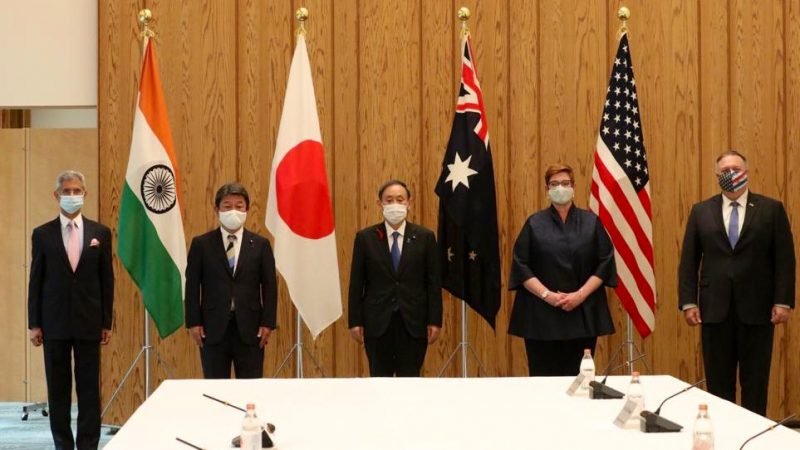India – Australia – USA – Japan Ministerial Meeting

The Second India-Australia-Japan-USA Ministerial Meeting held in Tokyo has upheld its momentum with the Indian Foreign Minister, S. Jaishankar highlighting India’s commitments towards making the Indo-Pacific region free, open and inclusive. US Secretary of State, Mike Pompeo has also expressed his contentions, condemning the Chinese Communist Parties’ ‘exploitation, corruption and coercion.’ The Japanese counterpart, Toshimitsu Motegi, emphasised on the positive role of extra-regional powers in maintaining a Free and Open Indo-Pacific. While Australian Foreign Minister, Marise Payne, stressed on the need for regional powers to conform to the United Nations Convention for the Law of the Sea.
The second QUAD Ministerial Meeting, hosted by Tokyo soon after a ‘nominal prime ministerial transition’ depicts the importance of co-operation between countries in order to build a “true security framework” that could counter the challenge posed by the aggressive Dragon. Although none of the countries explicitly verbalised ‘China’, which seemed like a conscious decision to avoid Chineses’ claim that the QUAD is a military alliance designed to rein in China; yet it is undeniable that it was the elephant in the room. Dealing with consistent border standoffs with India, expansionism in the Pacific Region, affecting Australia and its neighbours alike, trade wars and superpower rivalry with the United States and maritime assertiveness with Japan, this QUAD meeting clearly seems to reflect the QUAD’s unique selling point. The meeting of the four foreign ministers in person despite the global pandemic symbolises the importance the QUAD Consultations have gained in recent times.
The countries focused on containing China amid it’s growing expansionist polices, assertiveness and increasing global footprint. The QUAD looked forward to establishing coordinated response to the problems emanating from the pandemic, seeking collective solutions for the same and discussed the need to share best practices to combat Covid-19 while reforming multilateral institutions and establishing post-pandemic international order. The Foreign Ministers also discussed about increasing cooperation to promote a shared vision for a free and open Indo-Pacific province with independent, strong and prosperous countries. With the advancement of instability throughout the world, Foreign Minister Jaishankar asserted on advancing security and economic interests of all countries having legitimate and vital interests in the Indo-Pacific. Although the countries had a common ground on most issues yet their expectations from the QUAD varied. The United States and Australia mentioned the need for the Quad to work towards countering misinformation. While India and Australia on the other hand mentioned about cooperation with respect to COVID-19 vaccines. Japan, USA and Australia mentioned about pursuing cooperation around quality infrastructure, cybersecurity and data related issues.
The meeting more or less focussed on strategic and security challenges in the region. It provided like-minded countries with the opportunity to discuss and improvise on global supply chains which was earlier dominated by China. Discussions on maritime security, stability and prosperity in the region also took place.
Aligned to establish a world order tackling the Dragons’ rise, the QUAD was Japans’ Prime Minister Shinzo Abe’s brainchild. With the vision of an “arc of freedom and prosperity” for the countries bordering the Indian and Pacific Oceans, the QUAD was established in 2006 but its importance seems to have quadrupled because of the ongoing challenges. Over time the QUAD has steadily grown in purpose, intention, shape and structure, added new dimensions to its agenda, regular assemblies to its schedule and upgraded the framework even as it remains under intense scrutiny and frequently subjected to criticism that spills over from the failure of its past, writes First Post. The QUAD’s regained strength is a testament to China’s aggressive rise, expansionist policies, economic coercion, and its multi-dimensional strategic and ideological threat to the post-second World War global order that forced a spontaneous formation of Indo-Pacific democracies.
China despite being taciturn towards the rise of an organisation targeting specific countries, individuals like Dhruva Jaishankar also help reservations for the same. Having an alarmist view, he sees the Quad as a “military alliance to contain China and its very idea” as “provocative, divisive and unnecessary”. The rise of QUAD speaks volumes about a collaboration between counties in order to squeeze China’s space in the Indo-Pacific and contain its revanchist policies, hard power bullying, and the way the strategic choices of nations at the receiving end are being shaped. In this new avatar being abetted by China’s aggressive ways, the QUAD is a clear manifestation of increasingly stiff resistance making it more likely for the QUAD to discuss making talks at this level a more permanent feature.


















